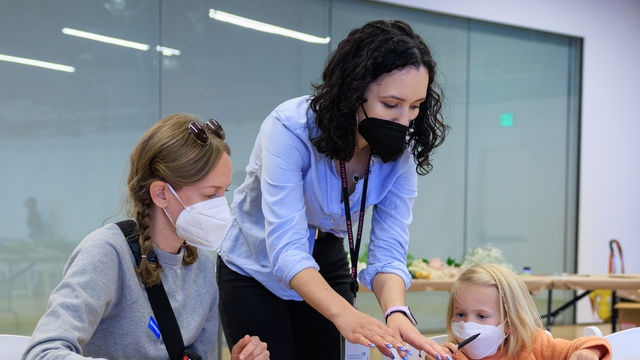
Emerging Museum Education Fellowship: Reflections on A Year of Learning
After working as a gallery attendant for some time I knew that I wanted to get back to an arts education-based environment, like when I was an assistant teaching artist, and work in an atmosphere that would provide a space for me to learn, create, and push me forward as an artist and educator. As the emerging museum education fellow for the 2021-22 academic year, my time in the academic programs department at the Hammer did just that. During my fellowship I received training on how to teach art to intergenerational audiences, make art more accessible, and facilitate tours for kids and adults alike. The fellowship culminated with the opportunity to create my own family program: Exploring Nature with Photograms.
I had the idea of a cyanotype workshop for families for some time, and this felt like the perfect opportunity to implement it. Cyanotypes are a type of photogram. They are created by placing objects on chemically treated paper (or fabric), which is then left in the sun for a few minutes, then washed off with water and air dried to reveal the final image. Traditionally the objects used in cyanotypes are flowers and plants. With that in mind, the goals of my program would be for families to learn a new artistic skill, explore their relationship to nature, and leave with some new appreciation for nature and our planet.
I found my ideas reflected back to me in noé olivas’s installation, Let’s Pray, which highlights how all living beings are connected on this earth, as well as the unseen labor of Latinx immigrants. It fit perfectly with my concept, as I wanted to highlight the overlooked labor nature provides for us and to support the work of fellow Latinx artists. As a part of this program, I created a looking guide that helps families explore the installation and inspires their thoughts around nature. It was important that these guides were also translated in Spanish, as olivas and I both come from Spanish-speaking Chicano communities. Since this program is targeted towards an intergenerational audience, I wanted to create a space where all family members could feel included and did not have to stress about interpreting the text.
With the assistance of my supervisors, Hallie and Tara, I spent the weeks leading up to my event monitoring budgets, creating floorplans, ordering supplies, and collaborating with a talented peer of mine, Courtney Coles, who I invited to be the teaching artist for the program. Although I was excited and nervous the morning of the program, I felt supported by my fellow staff who joined me. As soon as we began assisting the families, it was clear that the adults were just as amazed at the magic of cyanotypes as their tiny humans were. It was especially fulfilling to discuss noé olivas’s installation with a Latinx family who expressed its relatability to their own lives. The importance of seeing ourselves and our communities reflected in art and media is crucial, and it is critical that we take care of our planet so we can continue to see and make meaningful and fun art with each other. The most rewarding part of my fellowship has been the moments spent making and discussing art with folks, and seeing them make their own connections and finding meaning in the work they’re looking at. I am fortunate that moving forward I will get to continue this work as a teaching artist, where I will be able to create my own art classes and community workshops.





